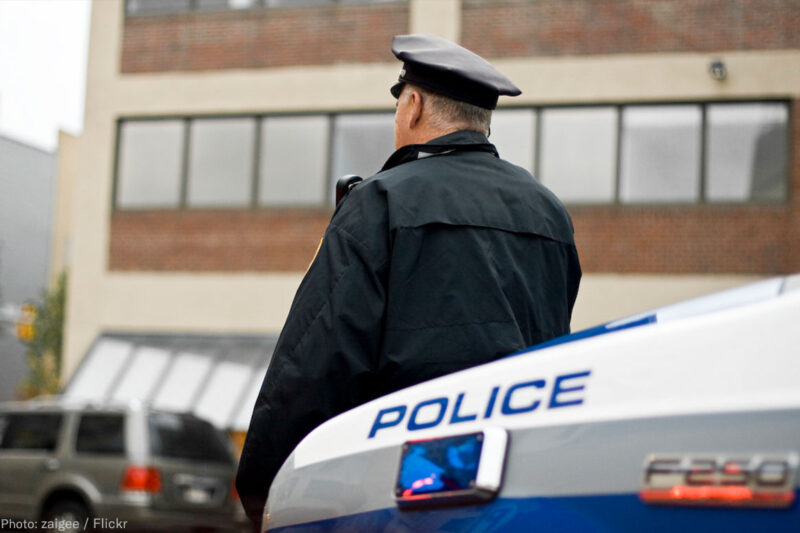Oops — Did Police Accidentally Reveal Unconstitutional Surveillance When They Tweeted a Screenshot?


On September 13, dozens of natural gas explosions hit three towns north of Boston, killing one person and impacting thousands more. In the first few hectic hours after the blasts, the Massachusetts State Police official Twitter account posted a tweet reading:
Updated plotting of confirmed fires and explosions by MSP Watch Center. 39 locations confirmed thus far. Number will grow. New responses ongoing. Reminder: all residents of Lawrence/Andover/N Andover who have Columbia Gas must evacuate, as should anyone else who smells gas.
Accompanying the tweet was an image of a map on a computer screen, showing locations of “confirmed fires and explosions.” Also visible in the image of the computer screen were bookmarks in a Google Chrome web browser.

Almost immediately, people on social media began to point to something disturbing about the image: The bookmarks bar on the Massachusetts State Police computer appeared to link to certain progressive organizing and activist groups in Central Massachusetts. What was meant as an innocent enough disaster response tweet had become damning evidence that law enforcement in Massachusetts continues to engage in questionable surveillance of left-leaning political organizers.

The screenshot from a tweet by the Massachusetts State Police showed bookmarks for the websites of progressive protest groups.
The groups in the browser bookmarks included Mass Action Against Police Brutality, Coalition to Organize and Mobilize Boston Against Trump (COMBAT), 413 Action, MA Activism, and Resistance Calendar.
Additionally, the bookmarks bar in the image showed links to a surveillance drone company called AeryonLive and a site about Open Source Intelligence Techniques.”
About a half hour after the first tweet was posted, it was deleted and replaced with a second image, which you can still find online. Notably, the second image does not contain the offending bookmarks bar.
The tweet was sent from the MSP Watch Center, which is located within the Commonwealth Fusion Center, one of a network of 79 “fusion centers” in the United States. These state and local police spy centers were established through funding provided by the Department of Homeland Security and the Department of Justice to promote information sharing among municipal, state, and federal law enforcement agencies after 9/11.
While fusion centers were established under the auspices of fighting terrorism, according to a bipartisan congressional report, they haven’t contributed anything meaningful to counterterrorism efforts. Instead, they have largely served as police surveillance and information sharing nodes for law enforcement efforts targeting the frequent subjects of police attention: Black and brown people, immigrants, dissidents, and the poor.
The Massachusetts State Police tweet provides the most recent evidence that this ugly history has extended into the present. In response, on Tuesday, the ACLU filed a public records request under the Massachusetts public records law asking for the all bookmarks and browsing histories from every computer at the Commonwealth Fusion Center.
After the state police deleted the tweet containing evidence of the MSP’s interest in these left-leaning groups, a police spokesman, David Procopio, released a statement claiming that the agency has a “responsibility to know about all large public gatherings of any type and by any group, regardless of their purpose and position, for public safety reasons…We do not collect information about – nor, frankly do we care about – any group’s beliefs or opinions.”
If that’s true, it’s odd that the bookmarks bar in the tweeted image only contained links to progressive and left-wing organizing/activist groups. The only way to confirm that the police department’s statement is true is to see the bookmarks and browsing history of its employees.
Surveillance of activist groups in Massachusetts is not new. In early 2018, the ACLU of Massachusetts released a report showing that between 2014 and 2016, the Boston Police Department used a social media surveillance system called Geofeedia to monitor individuals expressing constitutionally protected free speech on Twitter, Facebook, and YouTube. The records we disclosed revealed the police were monitoring hashtags such as “#MuslimLivesMatter” and “#BlackLivesMatter.” The cops’ social media surveillance software even caught a Thanksgiving Day Facebook post from former Boston City Councilor Tito Jackson. Back in 2015, reporting revealed that the State Police were monitoring social media accounts associated with the Black Lives Matter movement.
To fight against this anti-democratic surveillance, the ACLU of Massachusetts has long supported efforts at the Legislature to ban police from monitoring protected speech and activity. Last session, we supported the Fundamental Freedoms Act, which would have prohibited agencies like the Commonwealth Fusion Center from monitoring First Amendment-protected activities absent a showing that the target of the surveillance is likely involved in criminal activity. Specifically, the bill required that law enforcement have “reasonable grounds” to believe that someone has violated a crime before collecting intelligence information about them.
The best disinfectant is sunlight, which is why we filed this public records request seeking more information about the types of websites visited by state police employees assigned to the fusion center. We look forward to reading their response and to more scrutiny of law enforcement surveillance.
This piece was originally posted at PrivacySOS.org.
Every day across the nation, the ACLU is called on to defend all the freedoms guaranteed in the Constitution and the Bill of Rights. There's never been a more important time to support the ACLU and our effective work to protect civil liberties. If you like what you just read, help us continue to speak freely by donating today.

